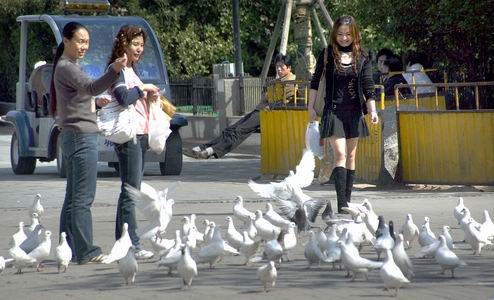
Tourists feed pigeons at People's Square yesterday.
The city is on high alert to avoid the potential threat of a bird flu
outbreak. - Zhang Suoqing
Xu Fang/Shanghai Daily news
A growing number of local
residents are complaining about neighbors who raise poultry or pigeons in their
homes, saying they are worried about the spread of bird flu.
Wang qiguang,
who lives in a residential community on Changzhong Road, said that one of his
neighbors has been raising three chickens in his home for a month. He sets the
chickens free every day so that they can take a walk.
"It is very risky as
this is a prevalent season for bird flu," Wang said.
Song yufen, a resident
in Zhabei District, said a man living on the top floor of his apartment building
is raising a flock of pigeons that come from an unclear source.
Though the
property management company has asked the man to stop raising the pigeons, he
has simply ignored them.
Some residents are voicing their complaints to the
media, while others are calling the city's hot line for agricultural
science.
"It is necessary to adopt measures to eliminate chickens and ducks
raised in the downtown area because it is banned by local regulations and it
will spread diseases easily, not only the bird flu," said Wang Zhitong, an
expert from the Shanghai Agritechnical Station.
Before anyone can raise
pigeons at their home in the city, they must get approval from the Shanghai
Homing Pigeon Association, and each of the birds must get vaccinations.
Shi
xingzhong, deputy director of the Shanghai Agricultural Commission, said the
government will discuss the situation and take measures to fix it soon.
While
it is unsafe to raise birds at home, Wang said it is still safe to eat chickens
and ducks.
"So far no cases of bird flu have been uncovered in the city and
Shanghai is strict in controlling poultry coming in. It is very safe as long as
you cook the meat properly because the virus will be killed by high
temperatures," Shi said.
Veterinary experts said bird flu, which first
appeared in Italy in 1878, is a major disease threatening the poultry breeding
industry but isn't the only concern. There are more than 80 kinds of infectious
diseases, verminosis and nutritional diseases that attack poultry.
Now 135
types of bird flu have been found. Among them, the H5 and H7 types are spread
most quickly.
The type prevailing in the world now is H5N1, one of the most
dangerous ones.



